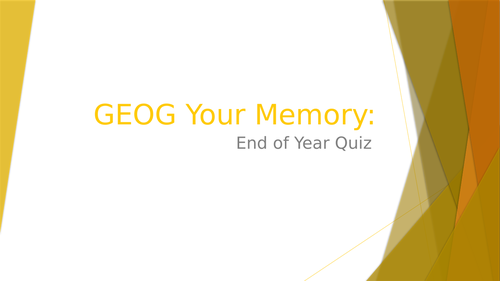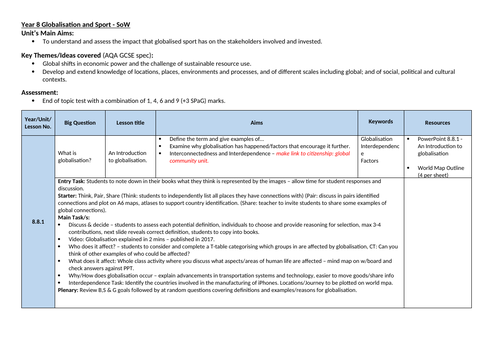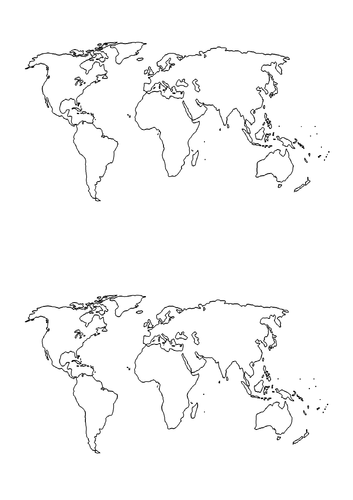39Uploads
14k+Views
3k+Downloads

Armistice/Remembrance Day - Assembly
10-15 minute assembly about Remembrance Day for KS3 or KS4.
Details about images and url link to the Last Post video included in the slide notes.

GEOGraphy Your Memory - End of Year Quiz
End of school year geography quiz to âGEOGâ your memory. suitable for all ages at secondary as questions are general trivia, landmarks/buildings and obscure flags etc, no alignment to GCSE specs etc.
Rounds:
Round 1: General Trivia (20 questioins) - 20x 1 point
Round 2: Landmarks/Buildings (10 questions) - 10x 2 points, 1 for name of landmark and 1 for location
Round 3: Obscure Flags (10 questions) - 10x 1 point for name of country/territory/location
All answers provided with animation.
Total points available: 50
Bundle

Tectonics - Unit of Work
Nine lesson unit of work that provides and introduction to tectonic hazards with a focus on earthquakes, including case study lessons.
All lesson presentations and resources for activities and/or tasks included.
Aimed at year 7 or early Key Stage 3 students.

Geography Keyword Keys - Display
A3 keys with important geography vocabulary inside, can be used as a display altogether or laminated and placed individually around a classroom room.
Words can also be edited to suit needs of students and the specification/SoWs of school.

Tectonics: L6 LIDC Earthquake Case Study
Case study lesson of an earthquake in an LIDC (low income developing country) - Haiti, 2010.
Lesson objectives:
Students will be able to describe the short and long term effects of the Haiti earthquake.
Students will be able to evaluate whether the level of development effects the level of damage caused by an earthquake.

Tectonics: L2 Earths Structure & Resources
Lesson two of topic for a year 7/early KS3 scheme of work covering tectonic hazards with a focus on earthquakes. Lesson presentation and all resources included.
Lesson Objectives:
Students must be able to label the structure of the Earth
Students should be able to understand and explain why and where earthquakes occur

Tectonics: L3 Earthquakes & Resources
Lesson three of this âTectonicsâ topic aimed at year 7/KS3, introduces students to what an earthquake is and what causes them to happen. A full lesson presentation and all corresponding task resources are included.
Lesson objectives:
Students must be able to locate where earthquakes happen.
Students should be able to use a range of geographical keywords to describe what an earthquake is like.

Case Study: Crocker Range Reserve Biosphere
Lesson resources, including lesson slides and activities/tasks for introducing students to the Crocker Range Reserve Biosphere in Borneo.
Download includes:
Lesson slides (for addition to wider lesson presentation)
Information sheet
Case Study card sort
Case study worksheet (student blank)
Case study worksheet (teacher completed)

Biodiversity Management in Madagascar
Case study fact file with about how biodiversity is being managed on the island of Madagascar.

Geography Facts - Display / TV / Social
Geography fact cards/slides that can be used as part of a classroom display, on TV displays around school or on departmental social media accounts.
Document can also be used as a template file and adjusted to suit school setting.

US States Word Search
A word search containing most* of the US States with a difficulty rating of advanced.
Not all fit due to the layout/construction of the word search itself.

Tectonics: L7 AC v LIDC Comparison
Students will learn to make comparisons and assess the impacts of a tectonic events on different countries.
Lesson objectives:
Students will be able to compare the impacts of the the Christchurch and Haiti earthquakes and identify which country was most affected using evidence.
Students will be able to assess in detail the impacts of the Christchurch and Haiti earthquakes and justify which one was most affected.

Globalisation & Sport: Unit of Work
Unitâs Main Aims:
To understand and assess the impact that globalised sport has on the stakeholders involved and invested.
Key Themes/Ideas covered (AQA GCSE spec):
Global shifts in economic power and the challenge of sustainable resource use.
Develop and extend knowledge of locations, places, environments and processes, and of different scales including global; and of social, political and cultural contexts.

Earth's Structure (Tectonics) - Worksheet
Full colour worksheet that requires students to label the different parts of the earthâs structure. Works well as a âDo Nowâ (starter) or recap activity as part of a lesson with a tectonics themed scheme of work.
Includes detail on depth of the layers and an area for students to gather additional information.

Map of the World - Outline (Worksheet)
Basic A5 (x2 per A4 page) outline of the map of the world great for using during location knowledge activities and perfect for students to build up an understanding of the shape of the world, continents, countries, oceans etc.

Tectonics: L1 Natural Hazards
Introduction lesson for a year 7/early KS3 scheme of work covering tectonic hazards with a focus on earthquakes. Lesson presentation and all resources included.

Tectonics: L8 Volcanoes
An introduction to volcanoes and the relationship between tectonics, plate boundaries and earthquakes.
Lesson objectives:
Students must be able to explain where volcanoes are found and what causes them to erupt.
Students should be able to identify the positive and negative consequences to living near volcanoes.

Geography Careers Information
Compiled list of more than 30 QR codes that provide direct and detailed access to a range of careers that can be pursued with a geography background from GCSE all the way up to degree level.
Information includes what the job/career entails, the qualification/s required, the level of pay and the route of progression that can be expected.
A simple but hopefully effective way of promoting geography as a valuable subject that offers great future prospects and opportunities.

OCR Changing Climate - Revision Grid
Threshold Concept Grid (TCG) revision resource for the OCR B Geography for Enquiring Minds âChanging Climateâ topic. Includes completed teacher answer sheet.
To be completed in three phases:
10/15 mins using only student knowledge
5/10 mins using student work book, knowledge organisers etc.
5 mins with teacher input and student contributions
May require adjustments for school specific case studies.






















